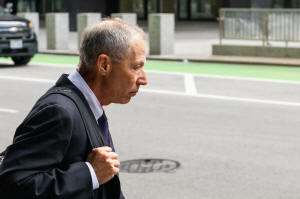Judge won’t acquit former AT&T Illinois boss in Madigan bribery case
after hung jury
 Send a link to a friend
Send a link to a friend
 [December 13, 2024]
By Hannah Meisel [December 13, 2024]
By Hannah Meisel
CHICAGO – A federal judge on Thursday declined to acquit former AT&T
Illinois president Paul La Schiazza after his September trial on charges
that he bribed ex-Illinois House Speaker Michael Madigan ended in a hung
jury.
U.S. District Judge Robert Gettleman was forced to declare a mistrial
after jurors failed to reach a verdict in La Schiazza’s case, which
ended a few weeks before Madigan’s trial began five floors down in
Chicago’s Dirksen Federal Courthouse.
La Schiazza is accused of bribing Madigan with a nine-month, $22,500
contract in 2017 for his ally, former state Rep. Eddie Acevedo. In
exchange, the feds allege, Madigan paved the way for AT&T’s biggest
legislative priority: relief from a 1930s-era regulation that obligated
the company to maintain its expensive and aging copper landline network.
During La Schiazza’s four-day trial, the jury heard from more than a
dozen witnesses, including two former AT&T Illinois lobbyists who
testified that Acevedo wasn’t a desirable hire. Newly retired from the
Illinois House after a 20-year career, Acevedo had a reputation for
being inflammatory and allegedly drinking to excess in Springfield.

But in February 2017, veteran Statehouse lobbyist Mike McClain, who was
known around the Capitol to be an “agent” of Madigan, asked an AT&T
executive if there was “even a small contract for Eddie Acevedo?”
Hours prior to that email, AT&T’s leadership team had gotten good news:
Madigan had agreed to sit down with La Schiazza and members of organized
labor to talk about their legislation. And two days later, La Schiazza
got even more good news on a call from McClain, who told him the speaker
had assigned AT&T’s legislation as a “special project.”
In his 35-page opinion, Gettleman acknowledged that prosecutors “offered
no direct evidence that Madigan was aware of McClain’s ask.” But, he
wrote, “a reasonable juror could easily rely on the circumstantial
evidence presented at trial to conclude beyond a reasonable doubt that
Madigan was aware of and directed the request.”
Gettleman said the timing of Acevedo’s contract, which was finally inked
in late April 2017, was key to AT&T’s passage of legislation getting the
company out from under the decades-old “Carrier of Last Resort,” or COLR,
regulations.
“Looking at a wider timeframe, the evidence shows that COLR relief
legislation had failed for over seven years, and finally passed after
defendant responded to McClain’s request to hire Acevedo,” Gettleman
wrote.
Zooming in on the sequence of events during the spring of 2017,
Gettleman wrote, is further proof of a “quid pro quo” understanding –
something that would be necessary to prove intent of bribery. The judge
focused on an email La Schiazza sent to his colleagues in late March
asking about the contract for Acevedo after indicating he’d gotten a
call from McClain.
[to top of second column]
|

Former AT&T Illinois president Paul La Schiazza exits the Dirksen
Federal Courthouse in Chicago in September after jury selection in
his bribery trial, which ultimately ended in a hung jury. (Capitol
News Illinois photo by Andrew Adams)

Somehow I thought we had this in progress??” La Schiazza wrote.
Gettleman referred to prosecutors’ presentation of cell phone records,
which showed a 23-minute call between La Schiazza and McClain before the
timestamp on the email.
“Defendant’s immediate attention to the Acevedo contract after receiving
a call form McClain in late March bolsters the inference that defendant
understood himself to be engaging in a quid pro quo,” Gettleman wrote.
La Schiazza’s attorneys argued he and his fellow AT&T executives were
just trying to build goodwill with the speaker and “not rock the boat”
by complying with the request for the “small contract” for Acevedo.
And while former AT&T lobbyist Steve Selcke said multiple times during
his time on the witness stand that he didn’t believe Acevedo’s contract
was meant as a bribe, Gettleman wrote that Selcke’s testimony actually
helped both the defense and the prosecution.
Gettleman happened to file his ruling as prosecutors in the trial
against Madigan and McClain are presenting evidence about the alleged
AT&T bribery before resting their case early next week. La Schiazza’s
attorneys attended Madigan’s trial Tuesday and Wednesday this week
before a long weekend break.
Defense attorneys this week unsuccessfully argued that prosecutors
should’ve been barred from presenting emails involving Selcke after they
decided not to call him in this trial. Selcke could be called in the
defense’s case after Madigan’s legal team subpoenaed him this week. His
attorneys also attended trial this week.

La Schiazza now lives on the East Coast but court records show his
presence at Thursday’s hearing has not been waived. If he is forced to
fly into Chicago, he’ll have already missed testimony from former AT&T
contract lobbyist Tom Cullen, who said in court he agreed to be an
intermediary for Acevedo’s payments in 2017.
La Schiazza is also unlikely to cross paths with Acevedo after he was
ordered to testify over objections from his lawyer and defense attorneys
about his dementia diagnosis. He’s scheduled to testify on Monday.
Capitol News Illinois is
a nonprofit, nonpartisan news service that distributes state government
coverage to hundreds of news outlets statewide. It is funded primarily
by the Illinois Press Foundation and the Robert R. McCormick Foundation. |